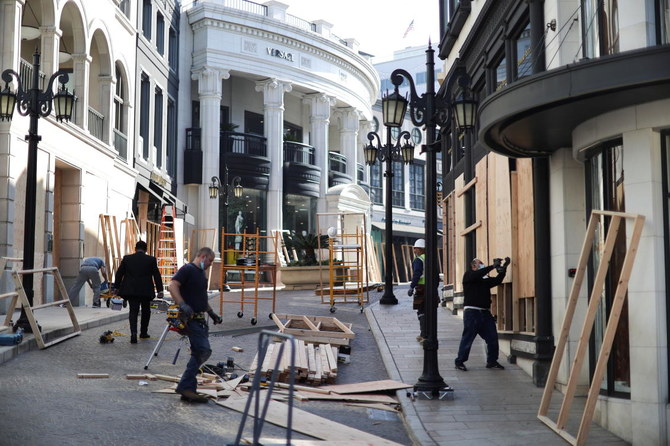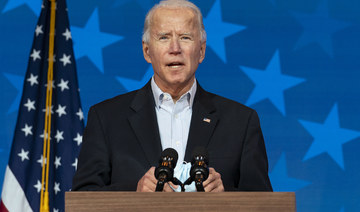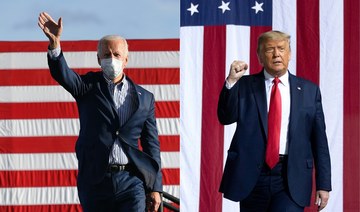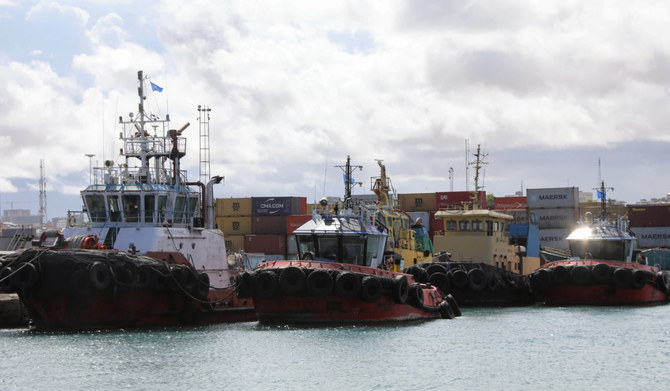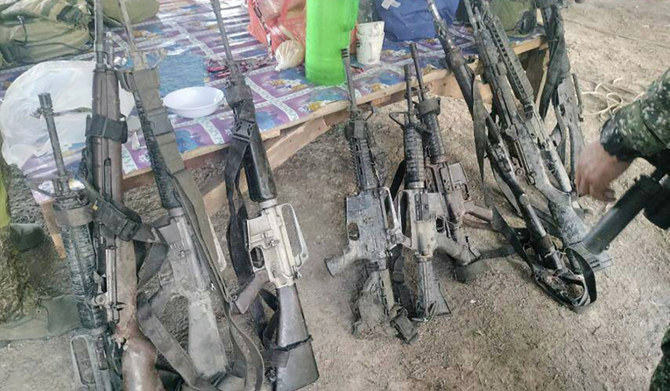CHICAGO, NEW YORK: Americans are preparing for the possibility of civil unrest when today’s contentious presidential election battle is decided between US President Donald Trump and his Democratic challenger, former Vice President Joe Biden.
Much of the violence is expected as a “spin-off” of riots and protests that have taken place since May 31 following the death of George Floyd.
Thousands of businesses were damaged and destroyed by looting and arson in the weeks and months after the killing, and after several other high profile police shootings.
The biggest targets have been businesses and shopping malls, which began boarding up windows in cities across the country, including Washington D.C., New York, Los Angeles and Chicago in anticipation of post election protests expected to turn violent.
Chicago Mayor Lori Lightfoot said that the city had been preparing for possible violence for months, telling protesters: “We all know that emotions will be high because they already are, and I urge you to channel those emotions into peaceful and productive expressions.”
As people voted in New York on Tuesday, construction teams in Manhattan continued to board up shops and store fronts.
More than 12 Arab-American owned businesses were looted and burned among the hundreds damaged after the Floyd killing.
Like in areas around many major cities, the suburbs of Chicago have prepared for violence, including in Orland Park, where police have erected barricades to prevent access.
Officers left some access to the Orland Park Shopping Mall open on Tuesday, leaving over 150 businesses free to trade, but planned to seal remaining entrances after voting was completed and the mall closed in the evening.
The US Marshals Service (USMS) issued a statement about potential violence, saying: “While the USMS generally does not discuss any potential enforcement activities, we can confirm that deputy US marshals stand ready to respond to violent acts of civil disobedience in any location in the nation.”
Plans were also underway to put the White House on lockdown, with 250 national guardsmen put on standby to work with local police.
Much of the fear of violence has been fueled by unconfirmed posts on social media from Democrats claiming Republican supporters would turn nasty in the event of an unfavorable outcome, and even that a group had tried to block a Biden campaign bus during a tour of Texas. Republicans, meanwhile, have claimed Democrats were readying more disorder under the guise of Black Lives Matter protests if Trump wins a second term.
The media has also fueled the violence narrative, asserting that Trump is fanning the flames of conflict through his campaign rhetoric.
Media outlet Spectrum News NY1 wrote on Tuesday morning: “Agitating the situation is President Donald Trump’s preemptive accusations, without evidence, of widespread voter fraud and his resistance to a peaceful transition should he lose, as well as fresh images of rioting at left-wing protests. It’s not alarmist; it’s fact: People are on edge, and law-enforcement agencies, and even social media companies, are at the ready.”

Rodeo Drive, the world renowned shopping street in Beverly Hills, California, is boarded up and closed to vehicular and pedestrian traffic on November 3, 2020 as a precaution against possible violence on the day of the US presidential election. (AFP)
A poll released this week by USA Today and Suffolk University said 75 percent of Americans were worried about post-election violence.
And a YouGov Poll also shows that 56 percent of Americans fear they will “see an increase in violence as a result of the election.”
One issue is that nearly every news media poll released over the past month shows Biden leading Trump. If Trump wins and undermines expectations, police fear concerns could translate into violence.
Although 97 million Americans have already voted — through early voting and voting by mail — as many as 35 million more are expected to cast ballots on Tuesday.






